1000mm Gasketed Filter Press Cloth
Met-Chem manufactures filter cloths for all makes and models of filter presses. Met-Chem offers a wide variety of sizes, materials, and weaves for your filter press. Our in-house sewing department can manufacturer any filter cloth to fit any filter press. All our filter cloths are made in the USA at our Cleveland, Ohio facility.
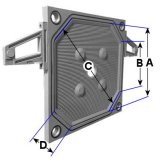
If you are not sure which fabric or size filter cloth you need, please contact us.
Met-Chem understands the time constraints put onto manufacturing facilities and there is often not enough time in the day or enough manpower available to perform maintenance such as Replacing the Filter Press Cloths in your filter press. If you do not have the time or manpower to change your filter press cloths, there are several options available to help with this issue
First, a set of plates, as small as 2, can be purchased from Met-Chem. This will allow you to swap out old plates with these new plates 2 at a time. This will allow you to take your time to change these two cloths. Once these two are done they can be swapped out for the next two that need done. This is performed until all the plates have been reclothed.
A second option is to send the filter press plates to Met-Chem to have them professionally changed be our Met-Chem Installation Team. The filter press plates will have their old cloths and gaskets removed. The plates will be given a thorough acid wash and then power washed. We will then install the new cloths and new gaskets. If you are able to have your filter press shutdown for a few days we can quickly perform the work on your plates and get them back ASAP. If you are not able to be down for a few days then we can provide you with either a full set of new plates or a partial set of filter press plates. As with option one, we will provide new plates with cloths and gaskets in the quantity that works for your timeline and budget. Once the new plates are installed in your filter press you will send your old plates to Met-Chem and we will perform the work on your current plates and send back once completed.
Whatever your needs are regarding filter presses Met-Chem has an option that can help. Please Contact Our Sales Team for assistance
Fabric Type | pH range | Temperature | Characteristics |
|---|---|---|---|
| Polypropylene | 2-12 | up to 190° F | Offers good tensile strength and abrasion resistance. They perform well in organic and mineral acids, solvents and alkalies. Polypropylene is attacked by nitric and chlorosulphonic acids, sodium and potassium hydroxide at high temperatures and concentrations. |
| Polyester | 2-9 | up to 325° F | Offers good resistance to most acids, oxidizing agents and organic solvents. Concentrated sulfuric and nitric acids are the exception. Polyesters are dissolved by alkalies at high concentrations. |
| Nylon | 2-8 | up to 250° F | Good tensile strength and alkali resistance but are degraded by mineral acids and oxidizing agents. This reaction is accelerated at high concentrations and temperatures. |
| Cotton | 3-10 | up to 225° F | Good abrasion resistance and mechanical strength. It is, however, subject to rot, mildew, and shrinkage. |
| Acrylic | 4-5 *Subject to other variables | 260 to 280°F / 125 to 135°C | The resistance of acrylic fibers is excellent in organic solvents, good in oxidizing agents, minerals and organic acids and fair in alkali. Will dissolve in sulfuric acid concentrations |
| Nomex* | 2 – 12 | up to 425°F | Resist attack by mild acids, mild alkalies, and most hydrocarbons. Resistance to sulfur oxides above the acid dew point at temperatures above 300°F is better than polyester. Flex resistance is excellent. |
| Kevlar* | 5-7 | Max operating temp 300-500°F / 149-260°C (Does not melt until over 800°F / 427°C) | Kevlar (aramid yarn) is chemically stable under a wide variety of exposure conditions; however, certain strong acids and bases can cause degradation, particularly over long periods of time and at elevated temperatures. |
Fiber | Tensile Strength | Abrasion Resistance | Chemical Resistance | Deg F | Deg C | PH | |||
Acid | Alkali | Cont. | Surge | Cont. | Surge | ||||
| Polypropylene | Excellent | Good | Excellent | Excellent | 190 | 190 | 90 | 90 | 2-12 |
| Polyester | Excellent | Excellent | Good | Fair | 275 | 325 | 135 | 150 | 2-7 |
| Nylon | Excellent | Excellent | Poor | Excellent | 200 | 250 | 90 | 120 | 2-8 |
| Cotton | Good | Average | Poor | Excellent | 180 | 225 | 80 | 105 | 3-10 |
| Acrylic | VeryGood | Average | VeryGood | Fair | 260 | 280 | 125 | 135 | |
| Nomex* | VeryGood | VeryGood | Fair | Good | 400 | 425 | 200 | 215 | 2-12 |
| Kevlar* | Excellent | Excellent | Fair | Good | 300 | 500 | 149 | 260 | 5-7 |
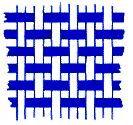


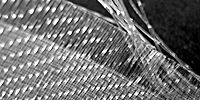
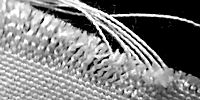
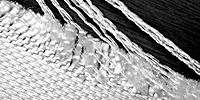
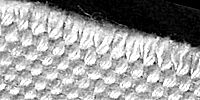
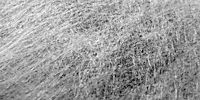
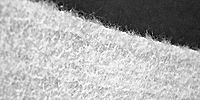
Met-Chem, Inc.
837 East 79th St.
Cleveland, OH 44103
Phone: (216) 881-7900
Email: info@metchem.com
Copyright © Met-Chem, Inc